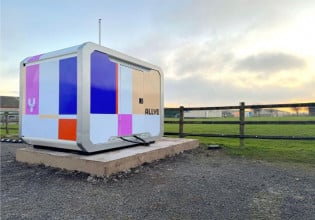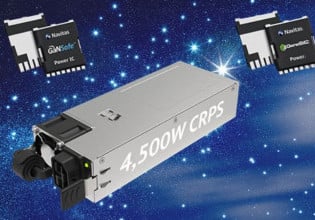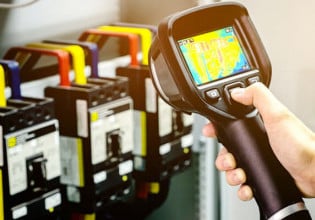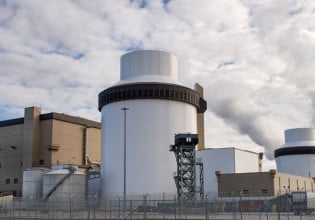The Power Behind Volkswagen’s New Mobile Charging Robot
German car manufacturer Volkswagen Group Components has unveiled new robot prototypes capable of charging electric vehicles.
The new machines can charge electric vehicles (EVs) autonomously and do not require fixed infrastructure.
While an official release date has not yet been announced, Volkswagen said these robots have “successfully reached prototype status and will now be comprehensively further developed.”
The mobile charging robot prototypes. Image used courtesy of Volkswagen Group Components.
Charging Electric Vehicles with Robots
The new, autonomous robots are capable of charging vehicles in restricted parking areas, such as underground garages and car parks.
“A ubiquitous charging infrastructure is, and remains, a key factor in the success of electric mobility,” said Volkswagen Group Components CEO Thomas Schmall, commenting on the news.
“Our charging robot is just one of several approaches, but is undoubtedly one of the most visionary,” Schmall added.
The autonomous machines are activated via a dedicated app or Car-to-X communication, and can independently steer to the vehicle to be charged and communicate with it.
They can open the charging socket flap to connect the plug, check when a vehicle is fully charged, then decouple the plug, and return the mobile energy storage unit back to the central charging station.
“It’s a visionary prototype, which can be made into reality quite quickly if the general conditions are right,” explained Volkswagen Group Components’ Head of Development Mark Möller.
“This approach has enormous economic potential. The constructional work as well as the costs for the assembly of the charging infrastructure can be reduced considerably through the use of the robots,” he added.
According to Möller, even the well-known problem of a charging station being blocked by another vehicle will no longer exist once the new autonomous robots are deployed.
“You simply choose any parking space as usual,” he added. “You can leave the rest to our electronic helper.”
Image used courtesy of Volkswagen Group Components.
Innovative Battery Pack Technologies
Designed by Volkswagen to entirely automate EVs’ charging process, the robots contain a 25kW ‘battery wagon’.
The integrated charging electronics within the machine allow it to provide DC quick charging with up to 50 kW on the vehicle.
To optimize the charge of multiple vehicles, the battery wagon is left to charge with one, while the robot proceeds to charge other EVs.
“Setting up an efficient charging infrastructure for the future is a central task that challenges the entire sector,” Schmall said.
According to the CEO, the new machines would be developed to embrace Volkswagen’s goal of developing solutions to help avoid expensive stand-alone measures.
“The mobile charging robot and our flexible quick-charging station are just two of these solutions,” Schmall said.
Image used courtesy of Volkswagen Group Components.
Improving Electric Vehicles’ Applications
The new machines are the latest efforts of Volkswagen in electro-mobility, which the company has been pursuing for some years.
Back in 2018, the German car manufacturer invested $100 Million in the development of QuantumScape solid-state battery technologies.
And in October last year, Volkswagen partnered with Infineon to showcase its latest electric model on the ID.3 Tour in Germany.
Moving forward, Volkswagen Group Components will be in charge of all Volkswagen Group charging activities and charging systems.
“Our developments do not just focus on customers’ needs and the technical prerequisites of electric vehicles,” Schmall explained. “They also consider the economic possibilities they offer potential partners.”
About Volkswagen
Founded in 1955, Volkswagen of America, Inc. is an operating unit of Volkswagen Group of America and a subsidiary of Volkswagen AG, with headquarters in Herndon, Virginia. Volkswagen’s operations in the United States include research and development, parts and vehicle processing, parts distribution centers, sales, marketing and service offices, financial service centers, and its state-of-the-art manufacturing facility in Chattanooga, Tennessee. The Volkswagen Group is one of the world's largest producers of passenger cars and Europe's largest automaker. Volkswagen sells the Arteon, Atlas, Atlas Cross Sport, Golf, Golf GTI, Jetta, Jetta GLI, Passat, and Tiguan vehicles through more than 600 independent U.S. dealers.






